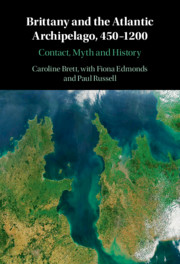Book contents
- Brittany and the Atlantic Archipelago, 450–1200
- Brittany and the Atlantic Archipelago, 450–1200
- Copyright page
- Contents
- Maps
- Tables
- Preface and Acknowledgements
- Abbreviations
- Additional material
- Introduction
- 1 Archaeology and the Origins of Brittany
- 2 Settlement and Isolation, 450–800
- 3 Brittany and Its Insular Past in the Ninth Century
- 4 Insular Contact and the Manuscript-Culture of Brittany in the Ninth and Tenth Centuries
- 5 From Invasion to Conquest: Brittany and Its History, 919–1066
- 6 Saints and Seaways: The Cult of Saints in Brittany and Its Archipelagic Links
- 7 Bretons and Britons in the Norman and Angevin Empires, 1066–1203
- Conclusion
- Bibliography
- Index
1 - Archaeology and the Origins of Brittany
Published online by Cambridge University Press: 21 October 2021
- Brittany and the Atlantic Archipelago, 450–1200
- Brittany and the Atlantic Archipelago, 450–1200
- Copyright page
- Contents
- Maps
- Tables
- Preface and Acknowledgements
- Abbreviations
- Additional material
- Introduction
- 1 Archaeology and the Origins of Brittany
- 2 Settlement and Isolation, 450–800
- 3 Brittany and Its Insular Past in the Ninth Century
- 4 Insular Contact and the Manuscript-Culture of Brittany in the Ninth and Tenth Centuries
- 5 From Invasion to Conquest: Brittany and Its History, 919–1066
- 6 Saints and Seaways: The Cult of Saints in Brittany and Its Archipelagic Links
- 7 Bretons and Britons in the Norman and Angevin Empires, 1066–1203
- Conclusion
- Bibliography
- Index
Summary
This chapter surveys the archaeological evidence for the period of the settlement of Brittany from Britain. The absorption of the Armorican peninsula into the land-based Roman Empire in the first century BC ended its long-standing role in prehistory as an important bridge for trade and cultural communication between the Atlantic Archipelago and the Continent. It was further marginalised by the concentration of resources in frontier zones under the late Empire. However, the political and economic decline of late-Roman Armorica was apparently gradual, in contrast with the sudden disruption of the relatively prosperous lowland zone of Britain in the early fifth century. Differences such as these may partly explain the absence of direct archaeological evidence for migration. The absence from Brittany of the high-status material culture seen in Britain outside the zone of English settlement in the fifth to seventh centuries (hill-forts, decorated metalwork, imported pottery) may reflect Brittany’s relative poverty but also the extreme diffusion of political power there, and a lesser degree of conflict. More modest, newly discovered archaeological evidence indicates Brittany’s continued connections to the wider world of north-western Europe in more basic developments in agriculture and rural settlement forms.
- Type
- Chapter
- Information
- Brittany and the Atlantic Archipelago, 450–1200 , pp. 32 - 67Publisher: Cambridge University PressPrint publication year: 2021

